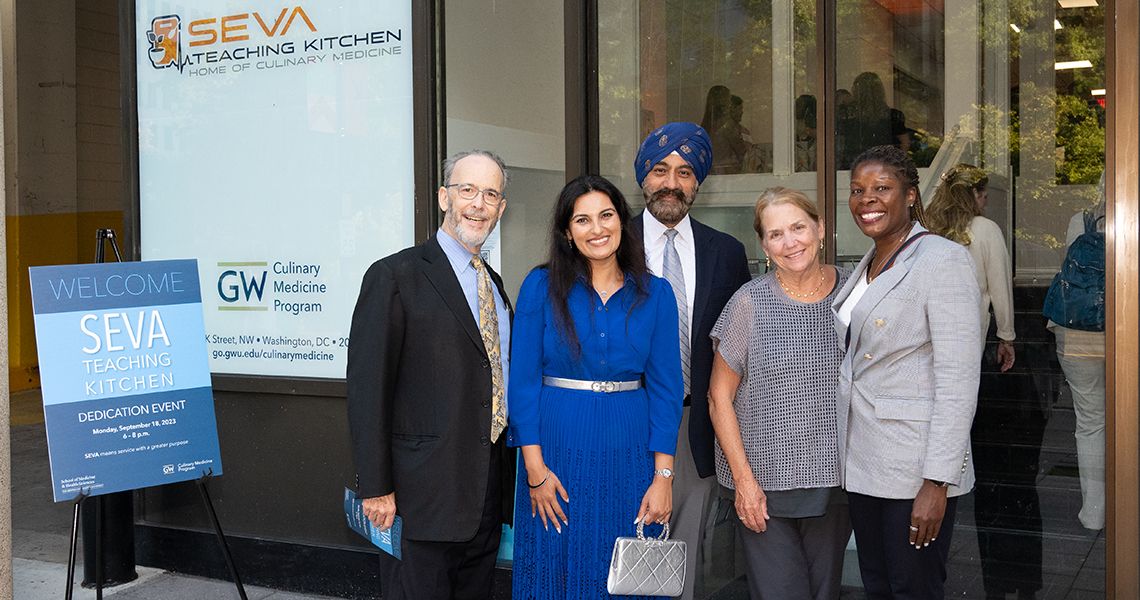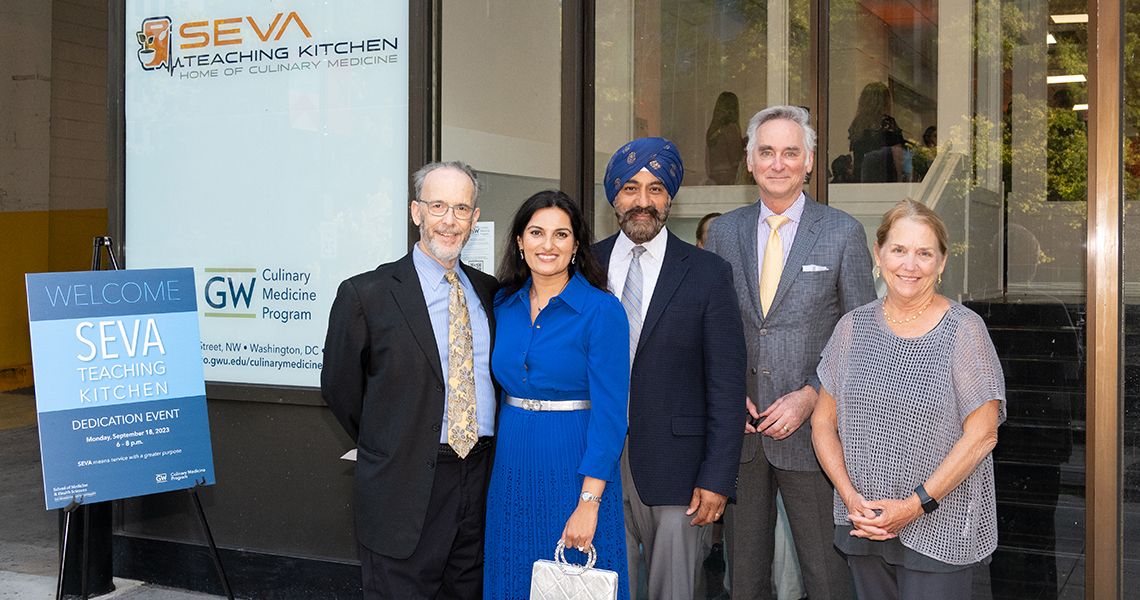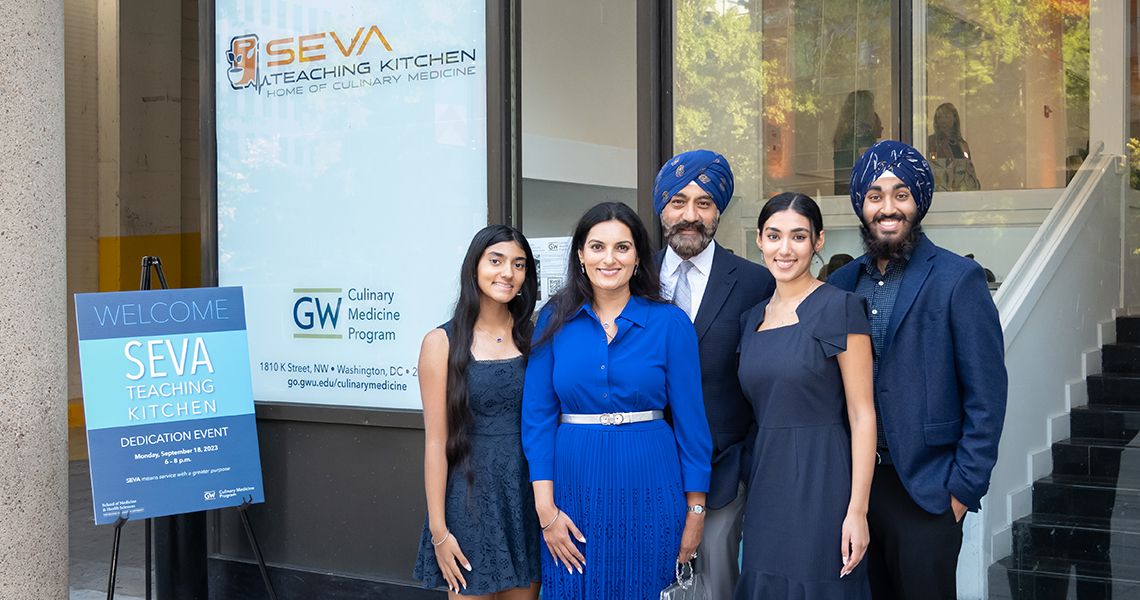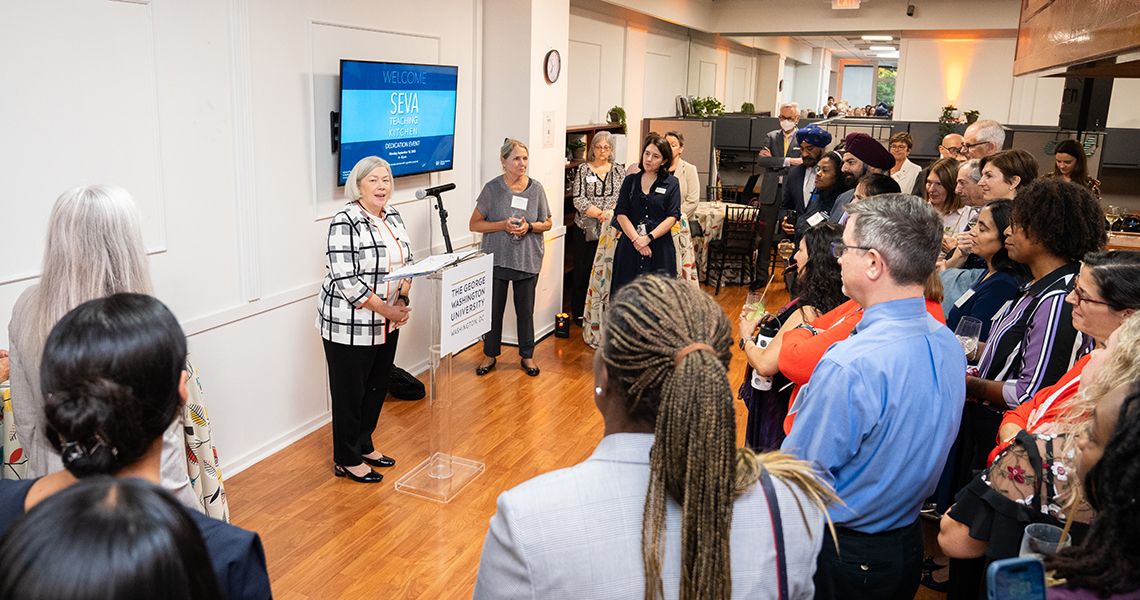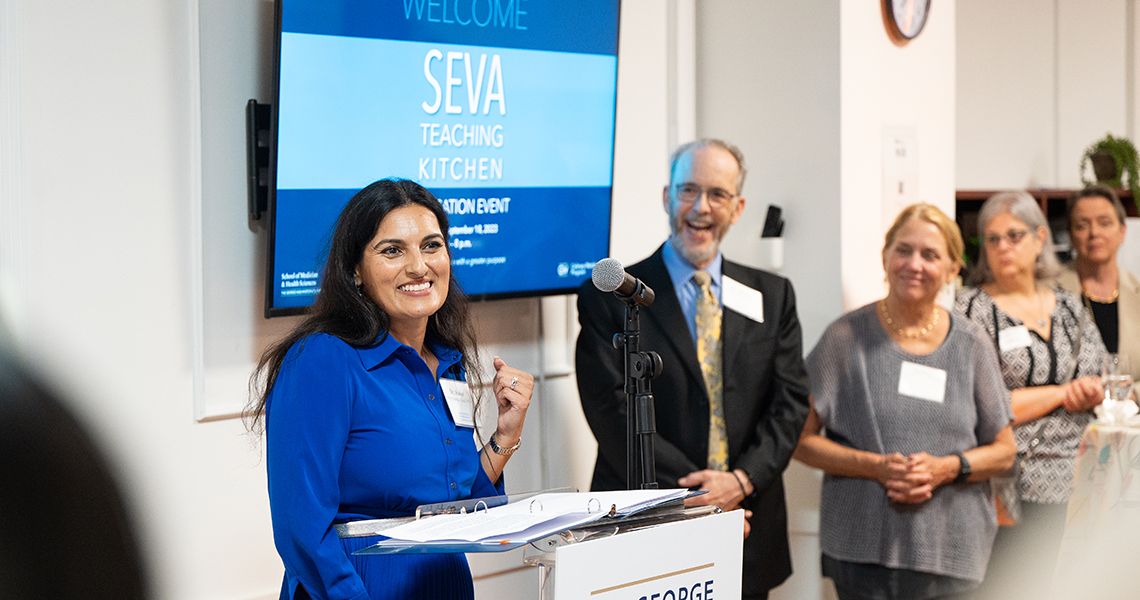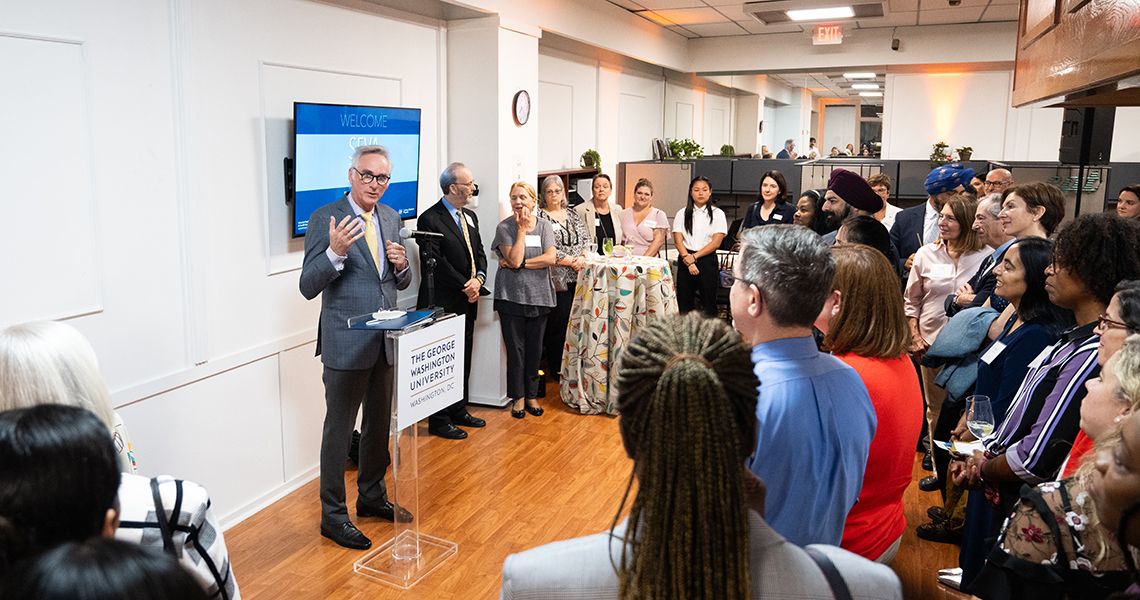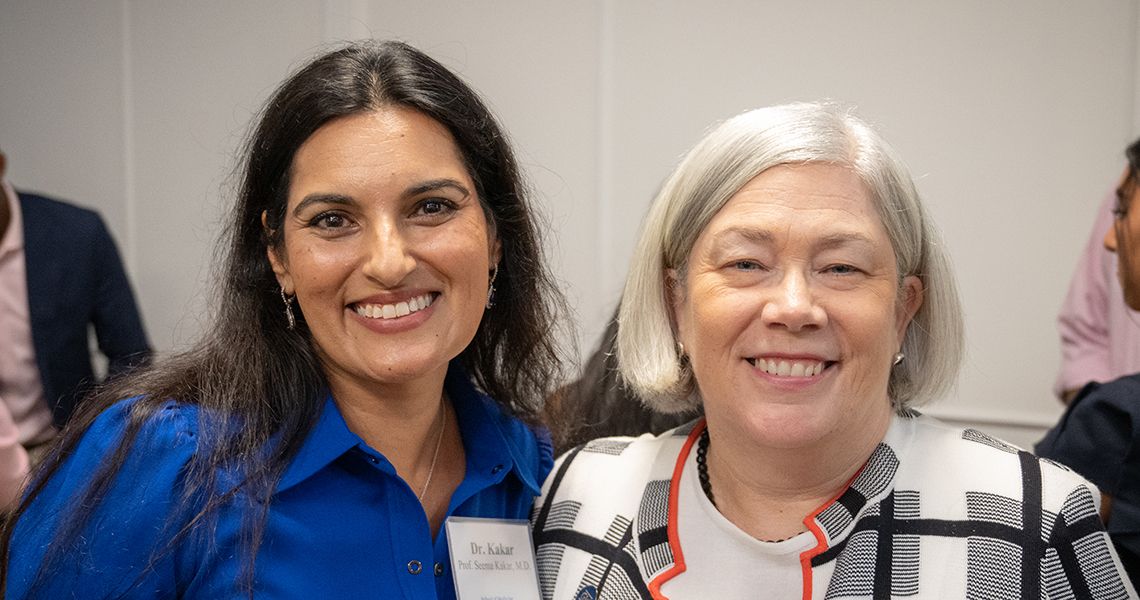The George Washington University School of Medicine and Health Sciences (SMHS) dedicated the new SEVA Teaching Kitchen, home to the school’s Culinary Medicine Program. The new facility at 1810 K St., NW, is the result of a generous gift from the program’s founding faculty member Seema Kakar, MD, RESD ’09, and her husband, Sonny.
“On behalf of the entire GW community, thank you for your commitment and generosity,” said GW President Ellen M. Granberg. “The SEVA Teaching Kitchen and the Culinary Medicine Program are wonderful examples of the innovative, hands-on approaches our faculty and students take to improve the health of our community.”
The new facility, she added “will help ensure that generations of physicians and care providers understand how food can support health in their own lives and the lives of their patients, representing a fundamentally sustainable approach to medicine.”
Kakar, a former assistant clinical professor of medicine at GW SMHS and The GW Medical Faculty Associates, launched culinary medicine education elective for third- and fourth-year MD students at SMHS in 2017. Relying on rented space across town at the Capital Area Food Bank as a “laboratory,” the elective offered students a better understanding the importance of a balanced, nutritious diet tailored to individual needs.
Six years later, Kakar and her husband, Sonny, made a major philanthropic investment establishing the Seva Culinary Medicine Teaching Kitchen Fund to create the Seva Teaching Kitchen and amplify the message about eating and how food treats illness and prevents disease.
“Here in this innovative space, we can witness how culinary medicine has become an important element of the preparation of our students as future physicians and health care providers,” said Barbara L. Bass, MD, RESD ’86, professor of surgery, Walter A. Bloedorn Chair of Administrative Medicine, vice president for health affairs, dean of GW SMHS, and CEO of The GW MFA.
The new space enables the culinary medicine program to offer both in-person as well as virtual immersive hands-on cooking classes in which medical students, undergraduates and members of the broader community learn basic cooking skills, nutrition information, guidance for grocery shopping and recipe knowledge.
“Today’s doctors must be equipped not only with knowledge of diseases and treatments, but also with the understanding of the profound role that nutrition plays in preventative care and holistic well-being,” said Kakar. “By integrating culinary medicine into medical education, we are not only shaping better doctors, but also fostering a society that values healthful lifestyles and prevention.”
SEVA, a Punjabi word from the Sikh faith embodies service and compassion toward others, fundamental elements of health care and the GW SMHS mission. “It encompasses the idea that giving and nurturing are at the core of a fulfilling life,” she said.
In his remarks, Timothy S. Harlan, MD, associate professor of medicine and director of the GW Culinary Medicine Program, echoed the significance of the emerging discipline. A self-described, dyed-in-the-wool, Statin-writing fan of conventional health care, Harlan noted the tremendous impact new procedures and drug therapies have had on patient outcomes over the past 40 years. However, he noted, medicine has lost sight of tackling the root causes of disease.
“I’m looking for the core etiology of why my patient is sick,” Harlan explained. “I don't just want to treat them, I want to figure out why they’re sick.”
Over those same 40 years, he added, “there’s been an exponential rise in calorie-dense, nutrient-poor, easily accessible food, and the health care profession has been slow to respond.”
Harlan encouraged the health care professionals in attendance to think about nutrition and food quality during their next patient exam. “Ask yourself the following question, ‘is the primary reason this patient is in your exam room related to food?’ And the answer is probably about 70% of the time.”
The impact of the culinary medicine program’s emphasis on empowering patients will reflect out like a ripple across the Washington, D.C., region, said LaQuandra S. Nesbitt, MD, MPH, senior associate dean for population health sciences and health equity, and Bicentennial Endowed Professor of Medicine and Health Sciences.
Nesbitt, who oversees the Culinary Medicine Program in her role as executive director for the Center for Population Health Sciences and Health Equity, noted that in addition to informing patients who are in good health about the role food and a healthy diet can help prevent illness, there are also many people experiencing diet-related disease or illness. Those patients, she said, need to understand “how the food they consume contributes to their ability to heal from that condition or how the therapeutics that they are taking may be impacted by their diet.”
“As we think about the future of better serving residents in wards 7 and 8, as we launch initiatives like the Cedar Hill Alliance for Health Equity … and we think about the disproportionate burden of chronic diseases like diabetes, high blood pressure and types of cancer that are connected to diet,” she said, “we know that programs like culinary medicine can really have a high impact.”
Second-year medical student Michelle Wang, president of the Culinary Medicine Interest Group, described growing up in a family of immigrants, living in low-income communities and the impact food had on her. “I saw a lot of my neighbors, friends and family suffer from co-morbidities, preventable illnesses just because we did not have access to health care, food and proper produce. Whether I realize it or not, from a very young age I understood that food and food education was medicine.”
